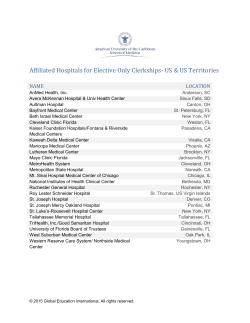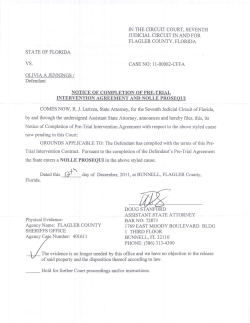
Important Updates on Standards and Assessments
State Board of Education Pam Stewart Commissioner of Education Gary Chartrand, Chair John R. Padget, Vice Chair Members John A. Colόn Marva Johnson Rebecca Fishman Lipsey Michael Olenick Andy Tuck DPS: 2015-31 Date: March 17, 2015 Technical Assistance Paper Important Updates on Standards and Assessments Summary: The department holds a call with superintendents and district directors of curriculum every other month. The call on February 11, 2015, included important updates on standards, instructional tools, and assessments, and a question and answer session with district staff. This TAP is a restatement of the notes from this call and the question and answer information, with some updates. There is new information about the Florida Standards Assessment Writing Component make-up schedule. This TAP supersedes the call notes sent to superintendents. Contact: See names and email addresses on each topic within the document. Status: X New Technical Assistance Paper Revises and replaces existing Technical Assistance Issued by the Florida Department of Education 2 1. CPALMS Course Description Updates (English Language Development Standards) – Steve.Neely@fldoe.org Course descriptions are being updated on CPALMS for the 2015-2016 school year to include English Language Development Standards. This update includes all General Education and Access courses. The department will include a discussion of English Language Development Standards in all future contentrelated discussions, training and conferences regarding content areas with the focus on enhancing student achievement for all students. This is part of an ongoing process to integrate Universal Design for Learning in all instruction and technology applications. 2. Student Tutorials Update – Steve.Neely@fldoe.org The Student Tutorials system is now available at www.floridastudents.org. There are currently more than 1,900 web-based resources reviewed and prepared for publication covering all grade levels and content areas, including language arts, mathematics, science and social studies. The roll-out of Florida educatordeveloped student tutorials will be continuous with nearly 500 focused, standards-aligned tutorials to follow the initial publication. We will provide periodic updates as they become available. The Student Tutorials system is a student-centered resource designed to assist a student with specific, standardsaligned content to supplement classwork. The tutorials and resources will be publicly available with no log-in required. 3. Item Bank and Test Platform Update – Todd.Clark@fldoe.org • • • • • • The Florida Interim Assessment Item Bank and Test Platform (IBTP) has been available for school district use since summer 2014 We have had seven school districts who have given student tests using the IBTP. The following districts have given computer-based tests to more than 1,000 students. o Flagler o Nassau o Polk o Sarasota Districts may also sign a security agreement and have assessment items transferred from the IBTP to their local assessment platform. Approximately 44 districts have already done this. There are some supporting activities that your district will need to accomplish to use the IBTP for computer-based tests for students. This includes providing classroom roster information using the Classroom Enrollment Tool (CET) and having students create a Single Sign-on account. We encourage districts to work with FDOE to accomplish these steps at least three weeks prior to their first computer-based assessment using IBTP. FDOE continues to work with the Central Florida Assessment Collaborative (CFAC) and other groups to continue to provide new assessment items into the IBTP for district use to develop and administer local assessments. For additional information or to schedule training, please email FLDOE-RTTTA@fldoe.org. Heather Wright, the Senior Director for Assessment, Accountability & Evaluation in Polk County, provided an update on their district’s experience with IBTP. We administered our mid-year progress monitoring test on the IBTP. We tested 2,000 to 4,000 students per grade level in all state tested courses and K-2 language arts. It went very smoothly, especially for being our first administration and of that scale. We have an older student information system, so at first we had some trouble with CET and rostering. We resolved it and students were able to test. For the Single Sign-on experience for students, it went well for the most part. Some elementary schools were not very excited www.fldoe.org 325 W. Gaines Street | Tallahassee, FL 32399-0400 | 850-245-0505 © 2014, Florida Department of Education. All Rights Reserved. 3 about students creating their accounts, so teachers or administrators created accounts for them. It was a great enhancement to the system for teachers to be able to pull lists of rosters. Regarding secure testers, some schools had trouble, but it was on their end and we were able to resolve it. We had no problem with network traffic once we implemented bandwidth shaping. During testing time, we made sure we had sufficient bandwidth allocated for those schools. 4. Florida Standards Assessment Update – Vince.Verges@fldoe.org FSA ELA Writing Component Field Tests are February 2-13. Grades 4-7 are paper-based, while grades 811 are computer-based. Approximately 70,000 students have completed field testing on computer, and 48 school districts are involved across grades 4-11. Approximately 22,000 students per grade were included in the statewide sample. Field testing is done in order to gather information on prompts for use in 2016 and beyond. Students who participated in the field test responded to two prompts, while operational testing only includes one prompt. Operational testing for the FSA ELA Writing Component is March 2March 13. In January 2015, a number of new resources were posted to the FSA Portal (http://www.fsassessments.org/). See the table below for more details. New Resource Folder Location Date Posted Updated Algebra 2 EOC Reference Sheet Spring 2015 FSA ELA and Mathematics 1/8/2015 Spring 2015 Writing TAM Spring 2015 ELA Writing Component 1/8/2015 Paper-Based Training Tests – Grades 3 & 4 ELA and Mathematics Paper-Based Training Test Materials 1/13/2015 Spring 2015 CBT TAM Spring 2015 FSA ELA and Mathematics 1/13/2015 Spring 2015 FSA ELA Writing Component Training Materials Spring 2015 ELA Writing Component 1/15/2015 2014-2015 Assessment Accommodations FAQ FDOE Announcements and Schedules 1/16/2015 CBT Worksheet and CBT Work Folder samples Spring 2015 FSA ELA and Mathematics 1/27/2015 www.fldoe.org 325 W. Gaines Street | Tallahassee, FL 32399-0400 | 850-245-0505 © 2014, Florida Department of Education. All Rights Reserved. 4 5. Extended Writing Make-up Dates – Victoria.Ash@fldoe.org As you know, students will receive a combined FSA ELA score this spring (Writing Component and Reading/Listening), and due to handscoring requirements, the Writing Component, which is administered in grades 4-10, must be administered earlier than the Reading/Listening Component. We have received questions from districts asking for direction regarding students who, for various reasons (out-of-state transfer, illness, etc.), do not participate in the FSA ELA Writing Component test administration, but are enrolled and able to participate in the Reading/Listening Component of the ELA assessment. In an effort to accommodate this relatively small number of students, we have established the following make-up windows for the ELA Writing Component. • • April 6-9, 2015 – students who complete the Writing Component during this make-up window will be included in regular reporting. May 4-8, 2015 – students who complete the Writing Component during this make-up window will be included in late reporting. Please adhere to the following guidance regarding this information. • • • • • Students who are enrolled and able to be tested during the initial administration window (March 2-13, 2015) MUST be tested at this time. Test Administration Manuals, unused paper-based test materials (test and answer books and planning sheets), and unused CBT planning sheets from the March administration should be retained in a secure location at the school or district until the conclusion of the make-up windows in the event they are needed. Additional orders may be placed and students must be added in the Test Information Distribution Engine (TIDE) for make-up administrations, if they were not previously present in TIDE. Paper-based materials for the April window must be ready for pickup on Monday, April 13, for these students’ scores to be included in regular reporting. Paper-based materials for the May window must be ready for pickup on Tuesday, May 12. Specific instructions for packaging makeup writing documents will be made available in March. Students whose Writing Component tests are invalidated are not eligible for a make-up test. 6. Use of Student Assessment Results – Juan.Copa@fldoe.org I would like to spend a few minutes discussing the use of student results from the statewide assessment that districts will receive this summer before performance-level standard setting is completed later this year. To be clear, districts will receive student scores on the FSA and new EOCs in the summer, as is typical; however, this summer there will not be achievement levels attached to those scores. Just as in the past when new assessments are administered for the first time, districts will receive t-scores, and new this year, for further context and assistance, districts will receive percentiles for the student scores as well. That is, you will be able to determine in what percentile a student scored, compared to all other students in the state of Florida who took the assessment. Achievement levels on the FSA and the new EOCs will be set later this year after the performance-level standard setting process is complete. Once set, those achievement levels will be used to report scores and inform student progression decisions and graduation requirements starting with the 2015-2016 results. For 2014-2015, the t-scores and percentiles that you will receive in the summer can help districts inform student course placement and progression decisions and graduation requirements. First, I will talk specifically about those assessments used for state-required student promotion decisions and graduation requirements – namely, the Grade 3 ELA FSA, the Grade 10 ELA FSA, and the new Algebra 1 EOC. www.fldoe.org 325 W. Gaines Street | Tallahassee, FL 32399-0400 | 850-245-0505 © 2014, Florida Department of Education. All Rights Reserved. 5 As stated in Section 1008.34(7)(c), F.S., “for purposes of determining grade 3 retention pursuant to s. 1008.25(5) and high school graduation pursuant to s. 1003.4282, student performance on the 2014-2015 statewide, standardized assessments shall be linked to 2013-2014 student performance expectations.” So, what does that mean? Essentially it means that though students will be taking the new assessment this year, the threshold by which these student decisions in third grade and in high school will be determined is the previous threshold. So, for example, for third grade retention, in 2013-2014, 19 percent of third graders scored a Level 1 in reading and faced potential retention. This year, a linked score will be determined for third grade that will in essence identify students in the 19th percentile or lower on the new assessment. It is this group of students that would need to avail themselves of the good cause exemptions in order to avoid retention in the third grade. For those who remember the transition from FCAT to FCAT 2.0 in 2010-2011, this is the same procedure that was followed then. It is important to remember that there are six good cause exemptions, and those continue to remain in place. Scoring Level 1 on the third grade assessment does not result, and has not resulted, in automatic retention, evidenced by the fact that typically less than half of students scoring Level 1 in third grade actually end up being retained. For the Grade 10 FSA ELA and Algebra 1 EOC, the same linking process will occur. However, keep in mind that, by statute, the current concordant scores on SAT and ACT and the comparative score for Algebra 1 on PERT, remain in place until new concordant and comparative scores are set. Also, students will continue to have multiple opportunities to retake these assessments before they are scheduled to graduate. Now, for all statewide, standardized assessments beside Grade 3 ELA, Grade 10 ELA and the Algebra 1 EOC, districts will not receive a linked score, but will receive t-scores and percentiles for each assessment. Districts can use that information, along with other information derived locally, to inform decisions on student progression, student placement in remediation courses, and any other local decisions that may rely at least in part upon state assessment results. For example, districts can use historical data on FCAT 2.0 to see typically what percent of students fall into Level 1 for remediation placement purposes, and identify the percentile that corresponds to that on the FSA results to identify students. So, for example, using the same logic described for grade 3, 18 percent of eighth graders scored a Level 1 on FCAT 2.0 Reading in 2014. Using the 2015 FSA ELA results, districts can identify students who scored at the 18th percentile or lower for potential placement in remediation. Districts have the flexibility during this transition year to use the available data to help inform these student-level decisions. Remember, there is no expectation – and never has been an expectation – that student-level decisions should be retroactively made later this year when the new achievement level cuts are determined. Again, that information will be used to inform decisions after the 2015-2016 administration of the test. That has been the typical policy followed by the state and districts any time a new assessment is implemented, and it remains the policy with the FSA and the new EOCs in Algebra 1, Algebra 2 and Geometry. 7. Monthly Florida Standards Update Memo – Denise.Barrett@fldoe.org We are pleased to announce the launch of our Monthly Florida Standards Update Memo. The purpose of this memo is to: 1. Provide ongoing up-to-date information on the Florida Standards; 2. Offer professional development support, best practices and resources to school districts, administrators and teachers; 3. Facilitate a forum for communication between educators and the department in an effort to increase knowledge and understanding and strengthen existing implementation plans and practices; and www.fldoe.org 325 W. Gaines Street | Tallahassee, FL 32399-0400 | 850-245-0505 © 2014, Florida Department of Education. All Rights Reserved. 6 4. Feature both a Math and English Language Arts Standard each month and the tools and resources available via CPALMS to teach them. You can begin receiving the Monthly Florida Standards Update Memo via the Chancellor's Weekly Memo emails by personally subscribing to the FDOE’s Paperless Communications System. Subscribing is simple and easy to do. Go to http://data.fldoe.org/communications/ and follow the user-friendly prompts. Be sure to select the K12 Chancellor’s Weekly Memorandum in order to start receiving the next edition of our Florida Standards update memo. 8. Third Grade Portfolio – Wendy.Stevens@fldoe.org The Florida Department of Education Third Grade Portfolio provides districts and classroom teachers with a resource which may be used to document evidence of an individual student’s mastery on the third grade English language arts standards who were not successful on the Florida Standards Assessment. The portfolio assessments can be accessed through Single Sign-on in the Item Bank and Test Platform (IBTP). Districts were sent portfolio guidance and resources on January 20, 2015. Updates including the district and teacher guidance, webinar slides, matrix and FAQs are being prepared and will be provided as soon as they are completed. If you accessed, copied and scheduled any of the portfolio passages and question sets that were previously released in January, please note that updated titles were re-released on February 4, 2015. Additional assessments will be released as they are completed and reviewed. A complete list of all passages and questions for the portfolio utilized from the IBTP will also be provided. Our goal is to provide districts with a resource that will assist in the development of a third grade portfolio. It is the district’s choice whether or not to utilize the resource. Please note: examples of evidence used to document student performance must meet the criteria pursuant to Section 1008.25(6), F.S., and State Board Rule 6A-1.094221, F.A.C. 9. FSA Writing Professional Development – Wendy.Stevens@fldoe.org The Just Read, Florida! office in collaboration with Differentiated Accountability provided FSA Writing Professional Development sessions in November and December across the state. The training was intended for district staff, reading coaches and/or lead teachers who could then replicate this professional development in the district. We decided to develop and capture the professional development on video with participants from selected districts. The final session was held at FDOE in the Turlington Building on Tuesday, February 24, 2015. It was videotaped and will be made available on CPALMS and the Just Read, Florida! website. The major emphasis of the training will be on instruction; however, participants will have the opportunity to become familiar with the format and scoring of the new FSA for Writing, keeping in mind this is a learning year for everyone. 10. English Language Arts Formative Assessment System – Wendy.Stevens@fldoe.org The English Language Arts Formative Assessment System (ELFAS) is an instructional resource created to support teachers implementing the English language arts standards. All K-8 formative assessments are available to all Florida teachers through Single Sign-on and can be accessed at www.fldoe.org/sso under Resources and Assessments. Designed for teachers in Florida, the resource is a database of K-8 formative assessment tasks and professional development toolkits. There are approximately four tasks per standard for a total of 1,500 www.fldoe.org 325 W. Gaines Street | Tallahassee, FL 32399-0400 | 850-245-0505 © 2014, Florida Department of Education. All Rights Reserved. 7 tasks in ELFAS. Please note that 1,309 of the formative tasks include required passages and 183 of the formative tasks do not include the required passages, but reference the passages that are generally available in the classroom or easily accessible. We recommend that teachers review the tasks before utilizing them to make sure that they have all the materials and stimuli associated with the formative assessment tasks to successfully use in their instruction. ELFAS does not have tasks associated with paired texts. ELFAS also offers research-based professional development that enhances teachers’ knowledge of the English language arts standards and the use of formative assessments by equipping them with the knowledge to implement formative assessment tasks within their instructional cycle. www.fldoe.org 325 W. Gaines Street | Tallahassee, FL 32399-0400 | 850-245-0505 © 2014, Florida Department of Education. All Rights Reserved. 8 Q&A 1. Regarding scores for placing students in intervention if not in third or tenth grade for reading, will there be cut scores given to us to say these are the students that would have been previously been Level 1 or 2, or will that be calculated at the district level? A: The only grade levels and subjects that will receive a linked score from the state for the purposes of promotion or graduation requirements are Grade 3 ELA, Grade 10 ELA and Algebra 1 EOC. Districts will have the flexibility in this transition year to use assessment data for other grade levels to determine remediation. Districts will get percentiles and t-scores for each student that can assist in making decisions locally for placing students the following year. 2. Are there any ELA formative assessment tasks with paired text? A: No. 3. For third grade students whose parents allow them to stay at home and not take FSA, is the portfolio or SAT-10 an option? A: State law requires participation. Please refer to the department’s TAP on Third-Grade Student Progression issued November 21, 2013, which can be found at http://www.fldoe.org/core/fileparse.php/7539/urlt/2013thirdgradeprogesstap.pdf. 4. Districts have flexibility for intensive placements based on results of FSA, but with the transition to FCAT 2.0 that was only reading. With the writing component added, what is the direction from state on the interpretation of that score? A: We are providing one score for ELA. There is no writing in grade 3, but ELA is linked to Grade 3 FCAT 2.0. In grade 10, both components are linked back to Grade 10 FCAT 2.0. If you are trying to identify at each grade which students need support in intensive reading, ELA, or math, in ELA there is one score and not two separate scores. 5. What will we do if a student moves in from another state in third grade and they move after the third grade ELA test? A: For any students moving in after testing, as has always been the case, make the same decision you have made in the past regarding testing those students. 6. Intensive reading is traditionally required. Since the writing score is now embedded, will the course change to intensive language arts? A: We have started that discussion, but for now it will remain intensive reading. 7. If the writing score is embedded in the reading piece, what if a third grade student moves in after writing? A: There is no writing component of grade 3 assessment. Writing is grades 4-11. www.fldoe.org 325 W. Gaines Street | Tallahassee, FL 32399-0400 | 850-245-0505 © 2014, Florida Department of Education. All Rights Reserved. 9 8. How can we determine proficiency if they were not there for writing part of test or the make-up? A: Try to have student take the assessment as a make-up. 9. If a parent kept a student home and missed all of FSA including make-up, what should we use to determine placement in next grade for ELA? A: We assume we have had students like this in the past and you should do what you have done in the past for these students. If it is tenth grade, do the retake. 10. If you have a third grade student that fails to pass FSA and you are testing all with SAT-10, are you still required to do a portfolio if the parent has not requested one? A: We have the same good cause exemptions we have had in the past. If they have an acceptable SAT-10 score, they can be promoted. A portfolio is an alternative. If any is student not making adequate progress on ELA, it would be best practice for teachers to have a portfolio for that student. 11. If a third grade student participates in ELA by sitting but does not receive a score (NR2), is that student eligible for alternate assessment or portfolio for good cause? A: Do what you have done in the past. If a student has not met attemptedness, do what you would have done in that instance. 12. Please clarify the make-up schedule. If a third grader sits and nothing else (NR2), is it considered a valid score and will it allow them to take SAT-10 or does a valid score have to be available? A: NR2 is not a valid score. Treat that student as you would other students for whom you did not have a score. Scheduling for writing should hinge on the March 2-13 operational assessment. Makeups are not to address capacity; they are for limited numbers. 13. What are the implications for students who do not participate in statewide EOC assessments? A: Students enrolled in courses that include a statewide EOC assessment are required to participate in the assessment and the results of the assessment must be factored in as 30% of the student’s course average. Willfully not participating in the assessment may negatively impact the student course average and student grade point average (GPA). www.fldoe.org 325 W. Gaines Street | Tallahassee, FL 32399-0400 | 850-245-0505 © 2014, Florida Department of Education. All Rights Reserved.
© Copyright 2025









